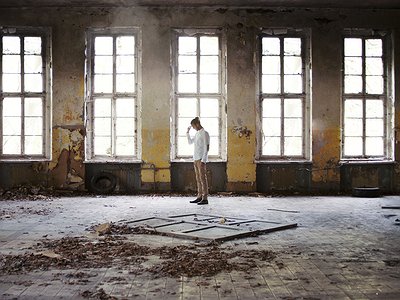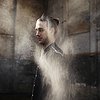Could you take us through a day in your life, from a possible morning routine through to your work? Do you have a fixed schedule? How do music and other aspects of your life feed back into each other - do you separate them or instead try to make them blend seamlessly?
I’m a hard working bohemian, improvising by night and editing by day. I don’t have a routine throughout the day and I try to get out of it whenever one may come close. I find life is too frenetic these days to be able to make music without separating daily life with creative moments, that’s why I choose the night; people sleep, sirens stop, no one calls.
Could you describe your creative process on the basis of a piece or album that's particularly dear to you, please? Where did the ideas come from, how were they transformed in your mind, what did you start with and how do you refine these beginnings into the finished work of art?
Intuition is the strongest tool for me and I let it carry me along. Reaching a (sane) state of unconsciousness being driven by just music can sometimes bring out magic. The frantic piano playing in the first part of the track ‘Verve’ is an example, I have no idea how those lines came about but they did.
I write notation a lot whenever ideas may come at the piano or the cello and I find destroying and deconstructing ideas can often be a very powerful tool to develop things further. When it comes to recording string, my main focus is on the use of bow strokes on the cello. I imagine my bow is a paint brush adding colours to a canvas.
There are many descriptions of the ideal state of mind for being creative. What is it like for you? What supports this ideal state of mind and what are distractions? Are there strategies to enter into this state more easily?
I disconnect completely when I am in the studio, no phone, no Internet. It’s crucial to have a peaceful and quiet place to work. I don’t wait for the ideal state of mind to arrive, but rather think of my studio work as of the approach of a painter in their workshop. I’ve always been fond of the good Pablo Picasso’s; “Inspiration exists, but it has to find you working”.
How is playing live and writing music in the studio connected? What do you achieve and draw from each experience personally? How do you see the relationship between improvisation and composition in this regard?
Both are truly connected, in fact many of my new works are ideas that have emerged during my preparations for a tour. Writing music for me is a need, playing live is an amazing journey to share and experience together with an audience. I see the connection to be side by side when it comes to improvisation and composition, both happen at the studio and on stage.
How do you see the relationship between the 'sound' aspects of music and the 'composition' aspects? How do you work with sound and timbre to meet certain production ideas and in which way can certain sounds already take on compositional qualities?
Really beautiful question! I take sound and timbre as an essential part of my work, the subtleties in the sound can carry the magic in a piece of music and I find it can definitely take on compositional qualities. How you play a note or a melody would directly determine the emotional quality in the music, I’ve always been very inspired to explore this as much as I can in my work.
Our sense of hearing shares intriguing connections to other senses. From your experience, what are some of the most inspiring overlaps between different senses - and what do they tell us about the way our senses work? What happens to sound at its outermost borders?
I’ve always been captivated with the relationship between music and psychology and how strong a piece of music can impact your mental state, a good example is the work ‘Silentium’ by Arvo Pärt. I find this to be a masterpiece, so delicate and strong that has the power to bring you to a deep meditative state. Music and sounds has so many extrasensory associations that makes it incredibly powerful, the sensation of being lifted up briefly while listening to a piece of music is precious and it is what I look for the most when sharing my music with others.
Art can be a purpose in its own right, but it can also directly feed back into everyday life, take on a social and political role and lead to more engagement. Can you describe your approach to art and being an artist?
I think sensibility is undoubtedly related to the creation of art and being the artist’s sensibility what makes those creative minds to unconsciously (or at times very consciously) canalise the hard, turn those unaccepted and wrong things into forms of expression. Life (for us) wouldn’t exist without photosynthesis as it wouldn’t exist without artists.
It’s hard to live by the standard of inequality, I strongly believe this is by far the foremost important issue before trying to fix anything else around us. I would prefer none of us to exist unless there is a daily meal for each person standing on this earth. I wish people could forget about the stupid borders to finally come together for something real to happen one day.
It is remarkable, in a way, that we have arrived in the 21st century with the basic concept of music still intact. Do you have a vision of music, an idea of what music could be beyond its current form?
It’s interesting, there is something intrinsically nostalgic linked to music; vinyls don’t stop to increase on sales and we are now bringing artists from the past to be on stage as holograms.
I think music is one of those things that is beyond our understanding, it’s so powerful to us that may possibly prevail for next centuries to come as intact as it’s been. However, I can fully imagine new concepts coming in the near future, specially within the advances related to VR.



